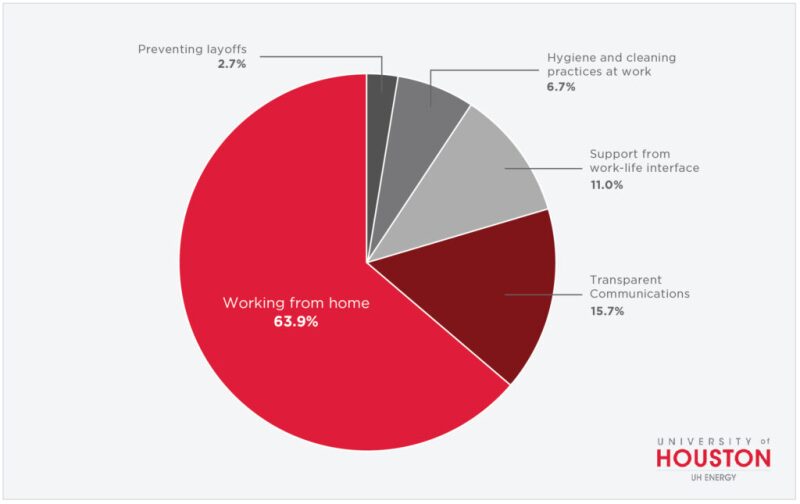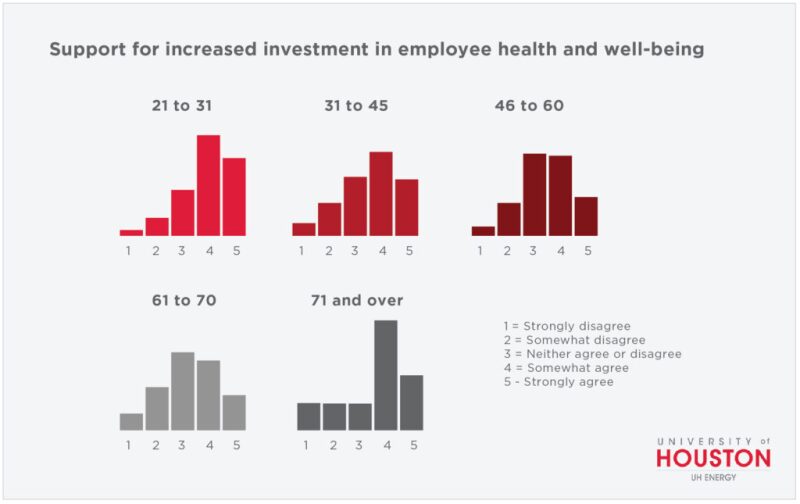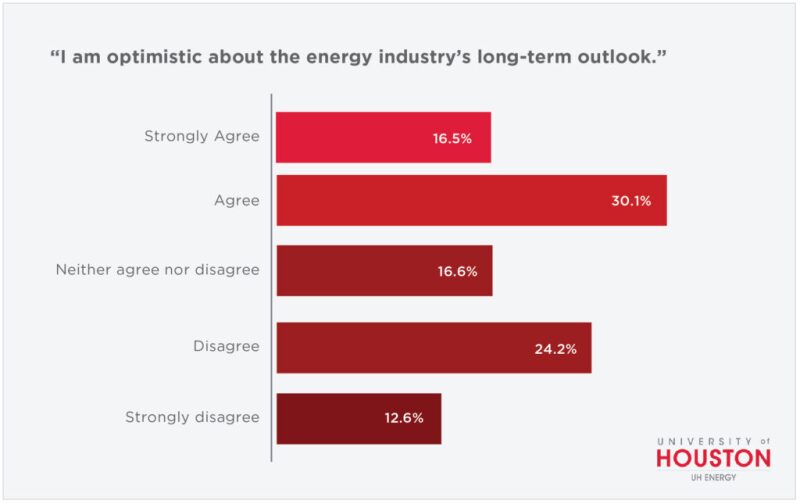The oil and gas industry has been hit hard by the current economic downturn brought on by the COVID-19 pandemic. These new economic and health challenges have forced companies to adjust how they do business internally and externally.
A recent survey from the University of Houston (UH) suggested that, overall, industry workers are satisfied with how their companies have reacted.
The survey, led by the UH Energy and three energy industry associations, found most workers in the energy sector said they approve of the way employers handled challenges brought on by the pandemic. However, responses show they are far less optimistic about their job security and the future of the industry.
UH Energy, along with the Petroleum Equipment and Services Association, the Independent Petroleum Association of America (IPAA), and Pink Petro, an organization supporting women in the energy industry, gathered data from a cross section of 408 energy workers through the online survey.
On average, participants had 16 years of experience in the industry; 83% of respondents worked in the oil and gas sector, and the remainder were split between the alternative energy, power, and utility sectors.
The study also recommends the types of data-driven policy solutions companies will need to start discussions about building the industry and its workforce in a fundamentally different context.
UH said it expects the report to contribute to the industry’s ability to capitalize on its workforce to weather the current economic and public health challenges and, as in prior economic downturns, to innovate, learn, and use technology to create more efficient systems that serve the industry and the public.
Purpose of the Study
UH Energy said that, as companies change technology and policies to address workforce challenges, employers, managers, and human resource professionals have asked how to handle the current crisis in a data-driven and evidence-based fashion. UH Energy noted this is relevant because only evidence- and data-driven policy solutions are likely to achieve the desired effect efficiently, minimizing the need for trial-and-error approaches to policy development and implementation.
Through conversations between its UH faculty experts and strategic industry partners, UH Energy determined three key questions that need to be addressed to provide the industry and its workforce with answers to guide policy development and decision making:
- What determines if energy employees view their companies as effective in reacting to low energy prices and COVID-19?
- What are best practices for mitigating the effects of COVID-19 and low energy prices on safety and energy employees’ health?
- What are implications of the downturn for health, safety, and the environment, as well as for our society?
Workers Approve of Industry Response
Overall, almost 90% of employees surveyed said their companies responded to the pandemic effectively, based on three issues:
- Whether the company had provided clear and honest information about the issue.
- Whether it had provided support to help workers juggle work responsibilities—as they perhaps cared for children or aging parents.
- The extent of the company’s preparation for the prospect of a global pandemic.
Companies provided “fast and efficient technology” for working remotely, according to 83% of workers. Supervisors also worked effectively with employees to resolve conflicts between work and family life, according to 71% of workers.
The study also analyzed how prevalent specific COVID-19 workforce policies were across the energy industry. Fig. 1 shows that, while some policies appear to have been almost universally adopted (e.g., providing flexibility to work from home, implementing social distancing requirements, and providing sufficient technology for remote work), others were adopted by only a small number of organizations (e.g., provision of backup solutions for child and elder care).

While the majority of workers said they approve of their company’s preparation and response, just more than half are less optimistic regarding their position and livelihood because of the downturn.
Pessimistic Outlook for Job Security
A further breakdown of the survey shows the pandemic caused 53% to worry about job security. Almost 40% are worried about paying their mortgage and other bills.
Other less optimistic highlights include:
- 46% of workers, regardless of age and experience, said they are optimistic about the industry’s future, although people with children at home were slightly less likely to be optimistic.
- 37% reported that concerns about the virus is affecting their sleep. That was especially true for people whose workload increased because of the virus, who struggled more with conflicts between work and family responsibilities, and who worried about job security.
- Approximately 27% said they had trouble remembering instructions, and 21% had trouble paying attention to details since the outbreak began, also suggesting safety risks.
- Though they were unable to get tested, 5.4% of workers reported symptoms consistent with COVID-19; of those who were tested, 0.2% tested positive.
Researchers recommended that the industry advocate for widespread testing of energy workers, along with strict guidelines prohibiting sick employees from reporting to work and continued wages for all workers who experience symptoms.
The survey also showed the pandemic has not slowed the importance of environmental, social, and corporate governance initiatives to the industry’s workforce.
Employees Value Health, Well-Being, and Community
The survey showed 55% of employees said companies should invest more in employee health and well-being (Fig. 2) and should continue growing projects supporting their local communities. In addition, 51% agreed the COVID-19 crisis shows that energy companies should invest more in projects that support their local communities.

Nearly half of the respondents (47%) said they believe alternative energy production would be less disrupted by the COVID-19 crisis than oil and gas production and processing. Still, worker responses were split in terms of their perspective on the effect of the crisis on sustainability initiatives.
UH Energy said the absence of clarity was reflective of overall uncertainties facing the energy industry, especially in the first phase of the global pandemic.
While it’s challenging to quantify the effect of the pandemic on hydrocarbon-based and alternative energy production, employees said they believed that oil and gas production and processing will take a greater hit from the ongoing crisis.

A substantial portion of the respondents (84%) said they were concerned about the future of the energy industry because of the combination of low oil prices and COVID-19 (Fig. 3). Nearly half (47%) of all respondents were optimistic (strongly agree and agree) about the long-term outlook of the energy industry.

